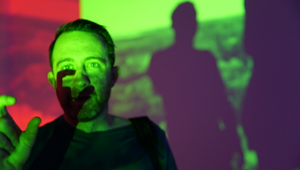
Bossing It: For Ryan Ennis "Being Transparent is Critical"

Ryan Ennis, executive producer and founder, worked his way up through the Los Angeles film community ranks experiencing every facet of commercial production hands-on. He uses that hard-earned knowledge to overcome any production challenge and deliver a creative vision as promised. All this without drinking coffee! Weird, yes, but he makes up for his lack of caffeine with an incredible work ethic and boundless energy.
Ryan has worked closely with well-respected agencies, TV networks, music labels, and on direct-to-brand projects. He loves the challenge of maximizing budgets and has the natural ability to stretch a dollar, pull a favour, create a last-minute miracle, and ensure it all ends with a big smile at the wrap party.
Ryan is a proud member of the Choctaw Nation, a Native American tribe originally occupying the South-eastern United States. He is passionate about advancing Native American and Indigenous representation in commercial and film production. He has begun a mentorship program through Reform School to help talented and under-represented people break into our industry. If you would like to learn more, please get in touch with Ryan at careers@reformschool.tv
LBB> What was your first experience of leadership?
Ryan> Growing up, I played a lot of sports. I learned at a young age what good leadership meant from my coaches. They taught me to deal with difficult personalities and play as one team.
LBB> How did you figure out what kind of leader you wanted to be – or what kind of leader you didn't want to be?
Ryan> For me, coming up from the bottom of the LA production scene as a freelancer meant I worked with all kinds of production companies, from the best to the worst. I was fortunate to work with a few brilliant producers and directors. This helped me determine what type of producer and human being I wanted to be when it was my time to lead. And how to avoid becoming a jerk.
LBB> What experience or moment gave you your biggest lesson in leadership?
Ryan> When jobs didn't go as planned, I definitely learned the most. Taking responsibility while ensuring those same things never happen again is all part of leading a team.
LBB> Did you know you always wanted to take on a leadership role? If so how did you work towards it and if not, when did you start realising that you had it in you?
Ryan> I always wanted to work for myself and have a say about the people I work with. When I started moving up in production, I realized I could work well with different people, personalities, and egos while keeping the mood fun on set. Which is valuable when trying to make comedy.
LBB> When it comes to 'leadership' as a skill, how much do you think is a natural part of personality, how much can be taught and learned?
Ryan> I think parts of leadership can be taught. I also believe there are natural-born leaders – the best leaders, in my opinion, embrace criticism to keep learning and growing. Having a sense of humour and calmness when it gets tense goes a long way.
LBB> What are the aspects of leadership that you find most personally challenging? And how do you work through them?
Ryan> I have always given people the benefit of the doubt. I am far from a micro-manager; I want my team to take initiative and make smart, creative decisions. Of course, sometimes I need to step in, which can be challenging but necessary.
LBB> Have you ever felt like you've failed whilst in charge? How did you address the issue and what did you learn from it?
Ryan> I have absolutely failed! We work in an industry of curveballs. You have to be able to adjust quickly and learn from those mistakes. Any leader who says they haven't failed seems like they never challenged themselves enough. When something doesn't go as planned, I step back, talk to the people involved, and figure out ways to get back on course.
LBB> In terms of leadership and openness, what's your approach there? Do you think it's important to be transparent as possible in the service of being authentic? Or is there a value in being careful and considered?
Ryan> Being transparent is critical. Of course, you have to calculate how you approach it. Being upfront and honest with everyone is how you safeguard against failure. Over-promising leads to disappointment. So, being clear and transparent with agencies, clients, and our directors is vital.
LBB> As you developed your leadership skills did you have a mentor, if so who were/are they and what have you learned? And on the flip side, do you mentor any aspiring leaders and how do you approach that relationship?
Ryan> Coming up and paying my dues in production, I am self-taught. But have also been fortunate to watch and learn from several influential producers. I've observed many different styles, and I have tried very hard to understand the positives and negatives of all of them. In the latter part of my freelance career, I got to work with Robert Herman, the founder/EP of Ruffian. The way Robert leads his team and treats people is something I admire.) I've also learned much from the incredibly talented directors I work with and represent.
As a member of the Choctaw Nation, I feel strongly about creating a path for Native Americans into this industry who are grossly underrepresented. Reform School established a mentorship program the day we launched. It is baked into our DNA: part production company, part school. We allow mentees from all backgrounds to shadow our directors on set and through every step of production. We are giving away all the dirty secrets for free since we remember how hard it was for us to break in.
LBB> It's been a really challenging few years - and that's an understatement. How do you lead a team out the other side of a difficult period?
Ryan> We officially launched in 2022 during covid-19, which offered me and my directing partner, Evan Silver, the advantages of building a company from scratch with today's challenges foremost on our minds. We take a much more modern approach to production than I ever have; this allows us to be more agile and creative even in the wake of declining budgets.
I stay positive and focused on the things I can control. My team and I are helplessly devoted to making the best creative possible. No matter the limitations or storms this industry throws our way.
LBB> What are some ambitions and plans you have for the company and yourself in the coming year?
Ryan> We plan to gradually grow Reform School in ways that add to our mission while allowing us to remain a creative collective of friends. We have intentionally kept our director's roster and management team unified and tight. I am also focusing on growing our social+ capabilities, and we plan to produce more entertainment marketing content, which is where we started.
LBB> What have you noticed as the biggest changes in the industry during your career thus far? And do you have any predictions for future trends or themes?
Ryan> Do you mean from faxing call sheets and maps to now just pressing send on an email? The production workflow, client demands, and how we operate our productions have evolved over the past few years. The whole budget needs to show up on the screen. There's less need for impressive offices, erroneous EPs, and to put on a show for agencies. They just want to walk away with the best work.
LBB> And do you have any predictions for future trends or themes?
Ryan> This sounds cliché to say now, but the introduction of AI will continue to have the most significant influence on production. We have been planning and preparing to offer a new storytelling hybrid of traditional film production and AI. There is no going back. I'm ready for the chip implants!
LBB> How important is your company culture to the success of your business?
Ryan> Our company's culture and brand are as influential as the work. Bringing in diverse, interesting, passionate personalities adds to our company's culture and makes us who we are. We want to be a creative space for people to lean on. In a world of boring, we are trying to wake people up.
LBB> What are the most useful resources you've found to help you along your leadership journey?
Ryan> My ears and eyes. Always listen and always watch. There is always something new to learn.












